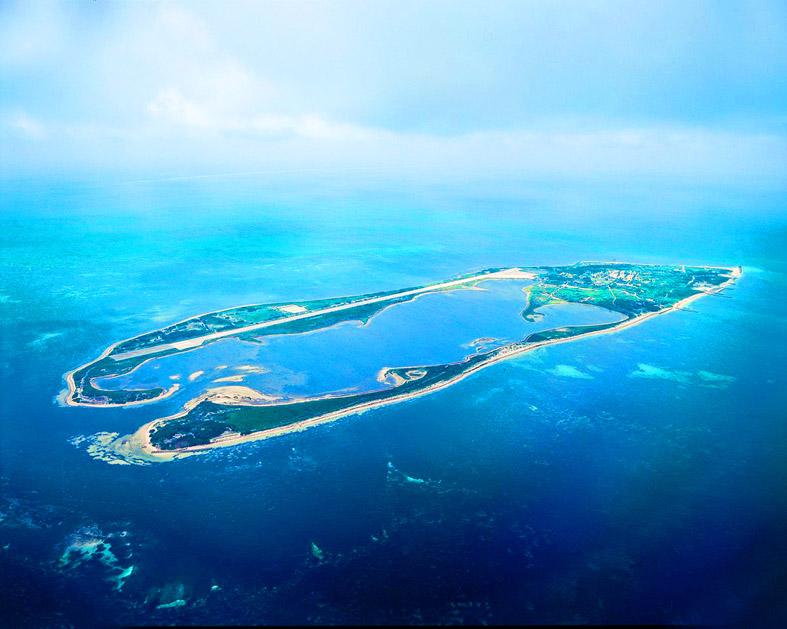Defense systems on two of Taiwan’s islands in the disputed South China Sea are capable of deterring an invasion by Chinese forces, defense officials said yesterday.
During a meeting of the legislature’s Foreign Affairs and National Defense Committee, Democratic Progressive Party Legislator Tsai Shih-ying (蔡適應) said that the Chinese People’s Liberation Army Navy had commissioned three new vessels last week, including a Type 075 helicopter landing dock.
The new amphibious assault vessel gives the Chinese navy the ability to launch various helicopters that could attack enemy vessels, ground forces or submarines, and could also be used to deploy landing craft and troops, he said.

Photo courtesy of the Water Resources Agency via CNA
Tsai asked whether the nation’s defense and weapons systems on the Pratas Islands (Dongsha Islands, 東沙群島) and Itu Aba Island (Taiping Island, 太平島) in the South China Sea are capable of dealing with the growing military threat posed by China.
Coast Guard Administration Director-General Chou Mei-wu (周美伍) said the coast guard, which is responsible for safeguarding the islands, is equipped with defensive weapon systems and would ask for military assistance if necessary in the event of a confrontation.
Lee Shih-Chiang (李世強), head of the Ministry of National Defense’s Department of Strategic Planning, said that the military has weapons to counter a Chinese invasion, but declined to provide details, citing secrecy.
The Pratas and Itu Aba islands are 450km and 1,600km southwest of Kaohsiung respectively. Coast guard personnel trained by marines are stationed on the islands, but the ministry last year said it would temporarily post marines on the Pratas amid reports that the Chinese military planned to conduct drills in the area.
The military never revealed details of the plan, nor did it confirm how many marines would be deployed or for how long.
The islands are defended by 40mm anti-aircraft artillery and 120mm mortars, according to media reports.
The coast guard had said earlier that it would deploy 292 Kestrel anti-armor rockets on the islands to bolster defense, amid Beijing’s increasing military incursions in the region.
The rocket, developed by the Chungshan Institute of Science and Technology, is a shoulder-launched weapon for armor and concrete penetration.
In addition to the Type 075 landing helicopter dock, China has also launched a Type 055 destroyer and a Type 094 Jin-class ballistic missile submarine.
Beijing’s military deployment in the South China Sea has created regional tensions, National Security Bureau Director-General Chen Ming-tung (陳明通) said, adding that the bureau is closely monitoring the situation.
Taiwan, Brunei, China, Indonesia, Malaysia, the Philippines and Vietnam claim all or part of the South China Sea.

Taiwan has received more than US$70 million in royalties as of the end of last year from developing the F-16V jet as countries worldwide purchase or upgrade to this popular model, government and military officials said on Saturday. Taiwan funded the development of the F-16V jet and ended up the sole investor as other countries withdrew from the program. Now the F-16V is increasingly popular and countries must pay Taiwan a percentage in royalties when they purchase new F-16V aircraft or upgrade older F-16 models. The next five years are expected to be the peak for these royalties, with Taiwan potentially earning

STAY IN YOUR LANE: As the US and Israel attack Iran, the ministry has warned China not to overstep by including Taiwanese citizens in its evacuation orders The Ministry of Foreign Affairs (MOFA) yesterday rebuked a statement by China’s embassy in Israel that it would evacuate Taiwanese holders of Chinese travel documents from Israel amid the latter’s escalating conflict with Iran. Tensions have risen across the Middle East in the wake of US and Israeli airstrikes on Iran beginning Saturday. China subsequently issued an evacuation notice for its citizens. In a news release, the Chinese embassy in Israel said holders of “Taiwan compatriot permits (台胞證)” issued to Taiwanese nationals by Chinese authorities for travel to China — could register for evacuation to Egypt. In Taipei, the ministry yesterday said Taiwan

Taiwan is awaiting official notification from the US regarding the status of the Agreement on Reciprocal Trade (ART) after the US Supreme Court ruled US President Donald Trump's global tariffs unconstitutional. Speaking to reporters before a legislative hearing today, Premier Cho Jung-tai (卓榮泰) said that Taiwan's negotiation team remains focused on ensuring that the bilateral trade deal remains intact despite the legal challenge to Trump's tariff policy. "The US has pledged to notify its trade partners once the subsequent administrative and legal processes are finalized, and that certainly includes Taiwan," Cho said when asked about opposition parties’ doubts that the ART was

If China chose to invade Taiwan tomorrow, it would only have to sever three undersea fiber-optic cable clusters to cause a data blackout, Jason Hsu (許毓仁), a senior fellow at the Hudson Institute and former Chinese Nationalist Party (KMT) legislator, told a US security panel yesterday. In a Taiwan contingency, cable disruption would be one of the earliest preinvasion actions and the signal that escalation had begun, he said, adding that Taiwan’s current cable repair capabilities are insufficient. The US-China Economic and Security Review Commission (USCC) yesterday held a hearing on US-China Competition Under the Sea, with Hsu speaking on